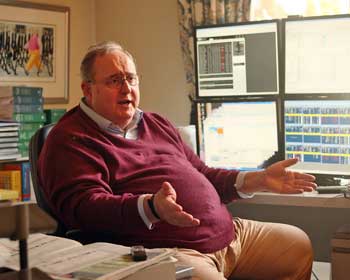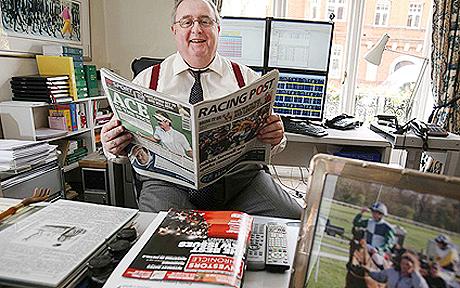Simon Cawkwell (born 1946), aka Evil Knievil is a famous spreadbetter who is highly successful at betting on companies whose share prices he believes are going to fall ('shorting').
Simon Cawkwell has built up a legendary status among the legions of day trading share punters. With a personality as big as his considerable frame, 63-year-old Mr Cawkwell is not, by his own admission, a modest man. Evil Knievel is perhaps best known for publicly identifying companies whose share price he believes are going to fall. He then backs up his accountant's acumen with hefty down bets. In this respect when Simon takes a position on a stock his actions are followed closely by market reporters and stockbrokers alike and dissected on investor website chat rooms. His words can inflict serious damage on a company, his share dealings make or lose him millions in moments. He is a puncturer of pomposity, an ingénue prepared to tell the emperor that he is butt naked.
 |
Simon Cawkwell aka Evil Knievil, well known investor and short seller, also sidekick to Tom Winnifrith of t1ps.com!
Hear Simon Cawkwell speak (dated May 2008)
Most investors speculate on the basis that stocks will rise; this contrasts with Mr Cawkwell, a north London ex-accountant with a taste for mischief and a great capacity for playing the stock market who has a particular interest in shares that fall. He specialises in selling shares that he does not yet own - taking short positions in the expectation that their price will fall. When share prices do fall he buys back the shares in the open market at the low price keeping the difference in the process.
'I work on the assumption that I'm intellectually superior to 99 people out of 100 and I'd give the other man a good run for his money,' he says.
'I think very quickly and carefully. The fools panic and I don't panic.' 'I love a crisis because that's when people are stupid,' he said with a broad grin. The working class are incredibly stupid. You can sell them anything if you appear to sell it sincerely. 'I've always liked fast-moving markets because the fools make more mistakes so I'm able to profit by it.'
Is he for real? One spread betting insider said: 'He's a very affable chap but at the same time he's a little full of himself. He's got accounts all around the City, he's very heavily margined. A £1 million short position wouldn't be uncommon. He's had some big winners but also some spectacular losers as well.'
Although Knievil is undoubtedly an inveterate gambler he bases his shorting punts on the fundamental health of companies' balance sheets using his experienced accountant's eye. Having made a huge reputation with big stock market bets, often controversially 'short-selling' companies to make a profit on falling shares, Cawkwell, has sometimes been compared with a Bond villain - a baddie of capitalism moving share prices for his own end from his London lair.
There is, he claims, nothing wrong in what he does. 'Short-selling is very ethical, moral behaviour. After all, if someone is buying a share, someone else is selling,' he says, simply.
He acknowledges that heavy short-selling could 'cause a company to enter into credit-raising difficulties at a critical moment' but maintains that 'the crisis has arisen long before the fall in the company's share price'. 'None of this is the fault of the short-sellers, that's nonsense. 'We don't create the weakness, that's due to bad management.'
His first noteworthy success dates back to 1990 when he published a research report on Maxwell Communication Corporation securities showing that without some creative accounting the corporation would have recorded a loss of £200 million.
'I made quarter of a million out of Maxwell going bust, which I thought was an excellent set of affairs,' he says roaring with laughter at the memory.
The note was published under the pseudonym Evil Knievil, a nom-de-plume that has stuck to him ever since as media writers helped mythologise the character. 'Evil popped up again a day or two later credited with the collapse of share price after share price. Some of which he had actually been responsible for and an appreciable number he hadn't. All good fun.'
Vital statistics
Name: Simon Cawkwell, aka Evil Knievil, aka the King of Short Selling in London
Age: 65, (born 1946)
Education: His father George was a Rhodes Scholar from New Zealand who became an Oxford classics don. Cawkwell, however, failed his entrance exam for Cambridge. Cawkwell attended Rugby School and trained as a chartered accountant at Coopers.
Family: Married with two daughters.
Hobbies: Family, puzzles, fine wines and a taste for gambling outside of the stock market.
Peculiarities: Specialises in staying alive despite hatred of exercise and despite heavy brain-damage through alcohol.
Additional Information: Simon does most of his research on the internet and by speaking to people on the phone. He is usually more interested in smaller stocks that are more volatile and less well researched than FTSE companies. Subscription to the t1ps website confers the privilege of listening to the great man rambling on about his latest positions in the market, the gee-gees...etc. If this is your passion, but only then, it may be value for money. Voice like mulled claret.
 |
Simon Cawkwell puts in 10 hours a day for six days a week at his office, which he calls Evil Towers
Cawkwell runs his business from a desk at his £1 million flat-cum-office which he calls Evil Towers in the upmarket West London district of South Kensington, slightly removed from the hedge fund capital-of nearby Mayfair. He typically puts in 10 hours a day for six days a week gazing at four computer screens filled with stock prices. "Of course I enjoy it," Simon proclaims. "I love trading and sport betting. I wouldn't be doing it if I didn't."
Quite impressively, he warned in November 2007 that Northern Rock's shares would be worth 5p and that the bank's woes represented one of the 'greatest shorting opportunity' he'd ever seen. He backed his own advice and made his usual £1m profit, but somehow it seems he could have made more! This is because his usual bookies couldn't take all his wager on Northern Rock so had to put part of his bet through agency brokers thus incurring a tax liability of £300,000.
And he's not only a trader but also a full-blown gambler. In one particular famous trade, he bet against Sporting Index's predictions on how northern hemisphere teams would perform against southern hemisphere teams in the Rugby World Cup. He ended cashing in £250,000 after siding with the southern hemisphere - this despite not having watched a rugby match since school!
He once claimed to wager about £1 million (average) a month on racehorses. At one point he was so successful that he had difficulties finding bookies willing to take his action.
Simon is also known to trade on the betting exchange Betfair and at one time prompted a prolonged dispute with the firm when his bet that Niall Quinn would not become permanent manager of Sunderland AFC was lost, despite Quinn stating that he was only taking the job temporary basis. Fellow Irishman Roy Keane took over the manager role a few weeks later in August 2006, after Betfair had already settled the market.
But not all the 25-stone trader's gambles are successful. In fact Evil Knievil does tend to get a fair number of his calls wrong so his stance is by no means guaranteed to be correct.
In one occasion he lost a cool £3 million when he shorted shares in the property company Regus. He had originally sold Regus in the belief that the company would go bust but a US bankruptcy court approved a restructuring plan and he could only watch in horror as the shares doubled in price and he was forced to buy the stock back at the behest of broker Cantor Fitzgerald. This year, his bet against Asos, the online fashion retailer and City darling, also seems to be losing him serious money: the stock has almost doubled in the past 12 months.
In another play on Kensington (LSE: KGN) I wrote back somewhere back in 2002.
My play on the looming crash is Kensington (LSE: KGN) a company providing mortgages to those whose credit rating is deemed too risky by normal banks. In a booming housing market this business works. When the housing market falters it will quickly become clear why Kensington's customers could not get loans elsewhere. At 215p Kensington may take several months to go my way but I am a patient man.
Even Mr Evil Knievil's prediction from underlying accounting analysis failed to see the outcomes precise timing, although he was ultimately right. It wasn't until early 2006 did Kensington start to fall - from a price of 1200p down to 462p and kept falling until Investec finally bought them out...
And this is the same man who announced that he made a million shorting shares in the aftermath of the 9/11 terrorist attacks - before promptly losing the money again as the markets rose!
What do we learn? If you are going to wait for any market eventual outcomes, be prepared to wait, wait and wait. Also, just shows you can't win them all albeit I think he wins more than he loses.
At the time of updating this article (September 2011) Simon Cawkwell also happens to be short of 'a few interesting stocks' in the USA, and has nothing but disdain for the average American speculator. 'USA retail investors are quite unquestionably the most f****** cretinous investors on earth. Their brains are made of ice cream and sawdust.' Harsh words, but par for the course from the son of an Oxford don with a taste for vintage wine and an obvious distaste for anybody he deems his intellectual inferior. Although well in his sixties Cawkwell has no thoughts of retirement: 'I enjoy it too much.' But what is interesting for someone that is so bent on betting on disaster is that Cawkwell is presently upbeat and is buying stocks that look very cheap. He's not worried that they might continue to trade cheaply for the forseeable future as he sees in them a bright future.
'We're in a period of credit contraction, and you might ask why you should buy stocks at all. But one day people will wake up and decide they want to get in, and when that happens, these things will start to fly.'
Evil Knievil has never really revealed the secrets of his success despite writing in detail about his experience as a compulsive spread better in his books - The Notorious Diaries of Evil Knievil and Evil's Good: Book of Boasts and Other Investments. However, it is well known that he looks in detail at company balance sheets for his edge and he does give a few sensible tips -:
THIS MUCH I KNOW: CAWKY'S LAW
Mr Cawkwell pointed out that he might be the most famous proponent of spread betting, but there were hundreds of worthy gamblers who are even more successful than him.
'People keep on publishing the fact that I'm successful' 'But there are many other people around that make plenty of money.'
Note: I am amazed at how big the stops are that some professional traders use, Evil Knievel is a prime example; his short on gold must be costing him a truckload, remember once he let losses build up to 3 million on Kensington - I believe that was before he bailed, they trade with enormously deep pockets and a certain stubbornness that is bordering on the unhealthy, still that's what makes the markets so interesting, if we all had the same view there wouldn't be a market.